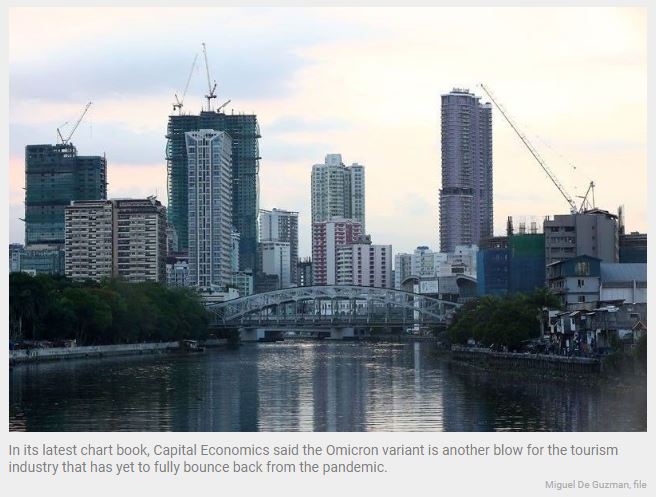Philippine recovery at risk from Omicron
MANILA, Philippines — The emergence of another COVID-19 variant may result in a loss of momentum in economic recovery in many countries, including the Philippines, as plans to reopen borders to tourism have been stalled indefinitely.
In its latest chart book, Capital Economics said the Omicron variant is another blow for the tourism industry that has yet to fully bounce back from the pandemic.
The Philippines and many other countries have temporarily banned foreign travels into their territories in order to prevent the entry of the new variant.
“The worsening prospects for regional tourism reinforce our view that after an initial reopening bounce in the final quarter of the year, economic recoveries will start to lose momentum in early 2022,” Capital Economics said.
In the Philippines, the think tank said the economy is poised for another strong rebound in the fourth quarter after improved private consumption drove a better-than-expected performance in the third quarter.
But Capital Economics said the Omicron variant ruined the initial plan to further reopen to international tourists.
“That said, the economy is starting from a very low base and the recovery has a long way to go,” it noted.
Capital Economics warned that economic fallout might be largest in emerging markets in Africa, South and Southeast Asia if the Omicron variant is proven to be more virulent.
Countries in these regions still have lower vaccination rates, limited fiscal space, and are heavily dependent on the tourism industry.
Last week, market intelligence firm IHS Markit said the Philippines’ continued reopening to travel and tourism is expected to bode well for a stronger economic recovery by 2022.
The Philippines has been logging improvements as daily COVID-19 cases continue to drop below the 1,000-mark and restrictions gradually eased.
Further, Capital Economics said the risk of future lockdowns is now much reduced as COVID-19 vaccination coverage is being ramped up and booster shots are being provided to priority groups.
But with the threat of Omicron, the London-based think tank said the Philippines would keep monetary policy loose for the foreseeable future to support demand.
“We think the Bangko Sentral ng Pilipinas will keep policy loose for some time, after staying on hold at its November meeting. The improving inflation situation should enable it to do so,” Capital Economics said.
Inflation has slipped to 4.6 percent in October and is expected to moderate further as a recent spike in food prices unwinds and the low base in fuel prices slips out of the annual comparison.
Source: https://www.philstar.com/business/2021/12/01/2144837/philippine-recovery-risk-omicron


 English
English




